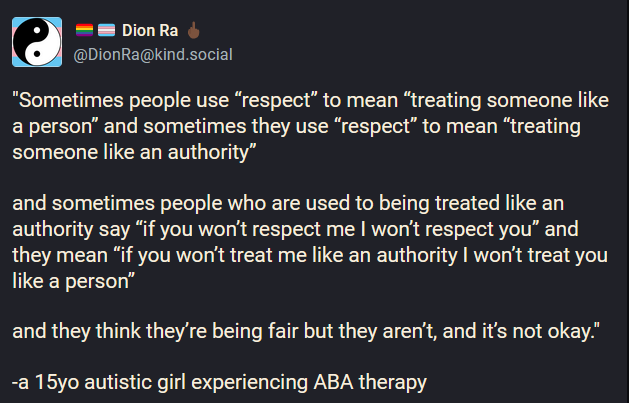this post was submitted on 25 Mar 2024
961 points (98.2% liked)
Anarchism
1444 readers
12 users here now
Discuss anarchist praxis and philosophy. Don't take yourselves too seriously.
Other anarchist comms
- !anarchism@slrpnk.net
- !anarchism@lemmy.blahaj.zone
- !anarchism@hexbear.net
- !anarchism@lemmy.ml
- !anarchism101@lemmy.ca
- !flippanarchy@lemmy.dbzer0.com
founded 1 year ago
MODERATORS
you are viewing a single comment's thread
view the rest of the comments
view the rest of the comments

No, it's not that. It's a form of therapy that is highly controversial, and mostly stems from the observation that autistic humans can be brought to “behave” like “normal people” if they are sufficiently conditioned to do that. Yet, it is not founded in religious BS, but rather a result of behavioral approaches to psychology that have been very popular, especially in the US and Canada at least since the 60s (like many addiction-therapies and such). Behavioral therapies aren't bad outright, but have spawned some questionable offspring (like all approaches in medicine tend to do). “Conversion camps” are such offspring. Regarding ABA: While many studies indicate that ABA does, in fact, bring autistic people to behave more like non-autistic people, that in itself is not evidence that the therapy is working. If depressive people behave like I want them to and get out of bed to clean the house because I hold a gun to their head, they are not “cured”. The same goes for this kind of therapy. There are merits to the principles of the approaches bundled under the term “ABA”, but the line between “helping Autistic people” and “torturing autistic people” is razor-thin. Unfortunately, many approaches that call themselves “ABA” are crossing that line, as do many therapists who deny people breaks or meals, or worse.
You know? Humans are cruel dumpster fires of bullshit once they think what they do is right and "for the best".
thanks for the clarification. Sounds like exactly what I suspected.
It's only controversial because the way the therapy has been implemented in the past (and unfortunately in some places still today) is similar to what you describe. However, modern practices don't try to train their clients to act like "normal people" and any serious technician or analyst will only use punishment (or threats of punishments) as a last resort in programs written to target the most imperative behaviors (like running into traffic). Instead, they focus on the use of reinforcement to teach their clients skills that help them to become self sufficient. Following your metaphor, it would be like offering a depressed person $10 for every chore they complete that day rather than holding a gun to their head. The goal is to establish a foundation for life outside of therapy, not to reduce the presentation of autism.